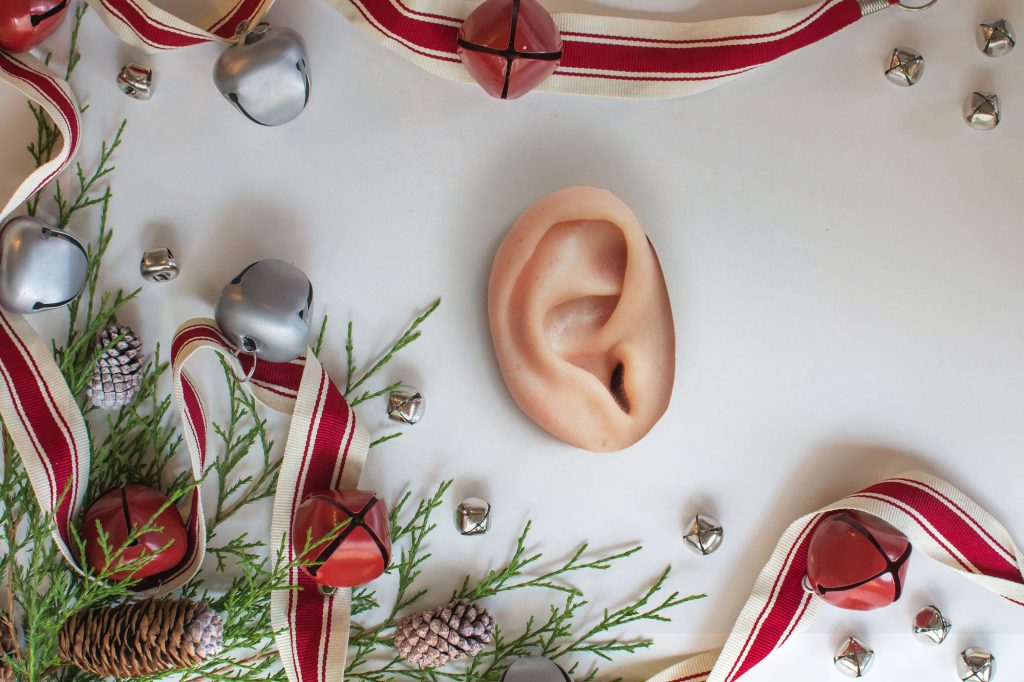This post is also available in Dutch.
Christmas is around the corner with lovely dinners to look forward to. For some, however, the thought of having to eat with family members at the same table is rather excruciating. Not because of a potential drunk uncle or stirred up family disputes, but because of the sounds of people eating they will certainly be exposed to. These people have misophonia, just like me.
When a simple chew makes you go crazy
Misophonia is an affective sound-processing disorder. It is described as the experience of having very strong negative emotions (such as anger and/or anxiety) in response to sounds that are generated by other people, leading to preoccupation and avoidance. Eating, drinking, and chewing are commonly mentioned to be triggering. Hearing or even seeing someone eat leads to simple irritation or disgust at first, but this very suddenly grows into panic or an outburst of anger. People with misophonia know their reaction is irrational, but it feels overwhelming and out of their control. Interestingly it often is mainly triggered by people you are close with, like family members. The onset is quite early, before puberty, and poorly recognized. It is more common in certain families and there are certain genes implicated.Even though misophonia might affect up to 20% of the population, little is known about this disorder.
The misophonic brain responds uniquely to triggers in areas dealing with sounds and emotions
People with misophonia do not have ‘sensitive ears’; their hearing is normal, but the processing of the triggering sounds is altered. Using both structural and functional MRI, a few studies have looked at whether people with and without misophonia (the control group) have different connectivity patterns and whether their brains respond differently to sounds or videos of eating, compared to neutral or other types of annoying sounds/videos. Despite the variety in results, there are some common findings. The auditory cortex, the brain area responsible for processing sounds, responds more strongly to chewing compared to neutral sounds. Secondly, the salience network, and specifically the Anterior Insula, are more involved in misophonic subjects exposed to triggering sounds/videos. The salience network consists of brain areas that are important for detecting, processing and filtering of, as the name predicts, salient stimuli. Within this network, the Anterior Insula is important for emotional evaluation and interoception, which is the processing of signals about your own bodily state. Together these brain results show that people with misophonia are attending to triggers more and this comes with negative emotions.
It’s not all about chewing
Typically these studies compare chewing sounds or videos to other unpleasant sounds like an alarm, children crying, or a dog barking, and to more neutral sounds like traffic, toilet flushing or rainfall. A recent study also included the sound of tapping fingers. Maybe surprising to some, for misophonic subjects, the researchers found increased connectivity between the Anterior Insula, the part of the brain that deals with the emotional evaluation of the triggering sounds, and the sensorimotor cortex, the part of the brain involved in the sensation of movements, and in this case specifically fingers. This refutes the idea that misophonia is all about chewing sounds and therefore an area specialized for mouth movement would be the ‘brain basis’ for misophonia. Indeed, people report that their misophonia can also be triggered by other sounds, especially repeating ones (personally, clocks drive me mad).
Surviving family Christmas dinner with misophonia: rest & distraction
Unfortunately, there is no cure for misophonia. It is important to learn how to cope with triggers instead of avoiding them and treatment is specialized cognitive therapy focused on decreasing attention to triggering sounds. My personal experience is that stress or a lack of sleep can aggravate misophonia. So, when dealing with all those chewing family members, make sure you are rested and try to relax and focus on the Christmas music instead.
Image based on both a Photo by Davies Designs Studio and Franco Antonio Giovanella on Unsplash
Author: Floortje Bouwkamp
Buddy: Marlijn ter Bekke
Editor: Helena Olraun
